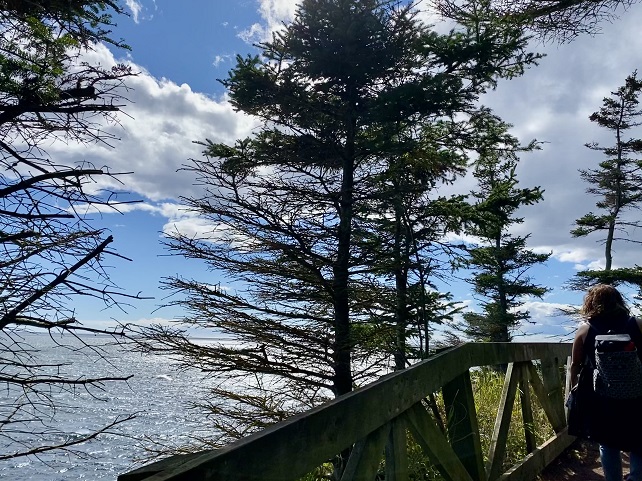LA RELÈVE: The «new normal ways» of traveling the world, par Shaira Salamanca
Once 2020 started, we began to face a health issue that had an immense impact on the world. The coronavirus was an unexpected situation that no one was prepared for. This pandemic created a huge pause on the world from businesses closing to people losing their jobs. As the world started to go on lockdown, the Tourism Industry had to stop their operations and cancel flights, which led to the closure of airports and the lay off of many workers around the globe. For months, the Travel Industry has struggled to get back on track, however, the world began to reopen its doors, which allowed people to start travelling little by little. Since many people around the world lost their jobs, they have a smaller budget when it comes to traveling. Due to this as well as a change in travellers behaviours, there comes the emergence of new trends, new ways of travelling as well as new experiences.
 Sunrise in Rimouski. Picture by Shaira Salamanca.
Sunrise in Rimouski. Picture by Shaira Salamanca.
To start off, since lots of countries were put on lockdown during the pandemic, travellers were not able to explore countries outside of their borders, which is why many people began to travel within their own countries. In fact, in Destination Canada’s Covid-19 research on its impacts on Domestic and International Travel, they predict that “domestic short-haul travel will likely be the driver of this rebound due to consumers’ lingering wariness of booking long-haul trips.” This forecasting illustrates how domestic travel will continue to take its peak as people have gotten more interested in travelling to places closer to them for a weekend or simply for a few days. Moreover, according to TripAdvisor’s Whitepaper, 44% of their survey takers like going on roadtrips within their own countries as they feel more safe and they have less contact with other people. Personally, before the Covid-19 pandemic, I always had the desire and interest to explore countries outside of Canada. However, after going on a road trip to Gaspesie with my family during summer, it opened my eyes on the beauty of my own country. Because of that, I now have a desire to travel more domestically, especially within Quebec. As many borders around the world remain closed, this will allow people to travel domestically before travelling internationally again.
Another emerging trend would be travelling to a destination that is mainly focused on nature that offers many outdoor activities that will allow people to avoid bigger crowds. As an example, during Covid-19, many people have peaked an interest in hiking as well as camping. As a matter of fact, 88% of outdoor attractions such as treks and national parks are open for visitors. With many indoor attractions still limiting a number of visitors post pandemic, this will push many people to enjoy the outdoors. This situation will encourage sustainable tourism as there will be a lower impact on the environment since there will be a smaller chance of mass tourism. Many of them will opt to travel to off-the-beaten track destinations, where they will have the opportunity to enjoy the beauty of nature while experiencing new things.
 Hike in Île-Bonaventure-et-du-Rocher-Percé National Park. Picture by Shaira Salamanca.
Hike in Île-Bonaventure-et-du-Rocher-Percé National Park. Picture by Shaira Salamanca.
The Coronavirus gave us all a reminder to focus on our health. Due to this, people will have new needs when travelling post pandemic, which they will adopt into a new way of travelling. They will start to focus on cleanliness and hygiene, this will have an impact on their choice of where to stay. According to the CEO of Oyo, a hospitality company based in India, he states that “small hotels are going to be in vogue. In my view, small is going to be the new big, wherein people will rethink a lot about going back to that 1,000-room hotel versus going to a 40-room niche hotel.” I totally agree with his statement because Covid-19 has definitely changed people’s mindset. We were constantly told to maintain a distance from others and to avoid going to crowded places due to safety fears. This mentality will somewhat stay with us as we have gotten used to it, it became our new normal. In fact, according to TripdAdvisor’s Whitepaper, in North and Latin America, many people have been searching for camping grounds, ranches, beach hotels as well as accommodations offering nature related activities nearby or on-site. This illustrates that travellers are starting to take a break from full service hotels and are looking into new experiences as well as new ways of travelling that will make them feel comfortable to explore the world again.
Lastly, for months, we had to limit our contact with people and stay in a small bubble such as with family and a few friends. Due to this, the number of group trips will reduce post pandemic and many people will be travelling alone or in a smaller group. According to a survey conducted by Thomas Cook India and SOTC Travel on Holiday Readiness Travel (post pandemic), 63% of respondents, residing in India, would rather travel alone, as a couple or with friends and family. This number does concern a specific country, however, it still gives us an idea on how some people may not choose to travel in big groups post pandemic.
In conclusion, the Coronavirus definitely changed the world of the Travel and Hospitality industry. There are many new emerging trends, destinations and accommodations but the silver lining is that people still have a desire to travel whether it is domestically, in smaller groups, in smaller accommodations to off-the-beaten track destinations. At the end of the day, everyone wants to travel again someday. It is always important to stay positive and optimistic so we can all enjoy a flight to our dream destination once this pandemic is over!
Shaira Salamanca, Tourism Student from LaSalle College
BIBLIOGRAPHY
Goyal, S. (2020). Future Shock: 25 travel and tourism trends post COVID 19. [online] Brandequity.economictimes.indiatimes.com. Available at: https://brandequity.economictimes.indiatimes.com/news/business-of-brands/future-shock-25-travel-tourism-trends-post-covid-19/75463449 [Accessed 14 Oct. 2020].
Destinationcanada.com. (2020). Covid-19’s impact on Canada’s Tourism Industry. [online] Available at: https://www.destinationcanada.com/sites/default/files/archive/1021-Impacts%20of%20COVID-19%20on%20Domestic%20and%20International%20Travel%20-%20April%2013%2C%202020/COVID-19%27s%20Impact%20on%20Canada%27s%20Tourism%20Industry__April%2013_EN.pdf [Accessed 14 Oct. 2020].
Blog:headout.com. (2020). The World is Reopening For Travel And Here’s How It Looks. [online] Available at: https://blog.headout.com/post-covid-travel-reopening-trends/ [Accessed 14 Oct. 2020].
Filipe Torres, J. (2020). Top factors travellers will consider before planning a trip – what hard-hit countries can consider. [online] Weforum.org. Available at: https://www.weforum.org/agenda/2020/07/top-factors-travellers-will-consider-post-covid-19-what-hard-hit-countries-can-consider/ [Accessed 14 Oct. 2020].
Chiang, S. (2020). How COVID-19 Will Change The Way We Travel: 10 Emerging Trends In A Post-Pandemic World. [online] Vulcanpost.com. Available at: https://vulcanpost.com/699618/travel-trends-post-covid-19-singapore/ [Accessed 14 Oct. 2020].
Threlfall, A. et al. (2020). Small the new big for hotels post-pandemic, says Oyo CEO. [online] Reuters.com. Available at: https://www.reuters.com/article/us-india-oyo-ceo-interview/small-the-new-big-for-hotels-post-pandemic-says-oyo-ceo-idUSKBN25S54M [Accessed 14 Oct. 2020].
Tripadvisor.com. (2020). Beyond Covid-19: The Road to Recovery for the Travel Industry. [online] Available at: https://www.tripadvisor.com/Covid19WhitepaperMay2020 [Accessed 14 Oct. 2020].
Sotc.in. (2020). Thomas Cook India & SOTC Travel Joint Survey Holiday Readiness Report May 2020. [online] Available at: https://www.sotc.in/export/sites/SOTCSite/downloads/Infographic-Thomas-Cook-India-and-SOTC-jointly-release-the-Holiday.pdf [Accessed 14 Oct. 2020].

Les plus commentés